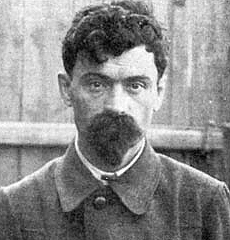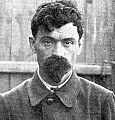Yakov Yurovsky facts for kids
Quick facts for kids
Yakov Yurovsky
|
|
|---|---|
| Яков Юровский | |
 |
|
| Born | 19 June 1878 |
| Died | 2 August 1938 (aged 60) |
| Occupation |
|
| Political party |
|
Yakov Mikhailovich Yurovsky (Russian: Яков Михайлович Юровский 19 June 1878 – 2 August 1938) was a Russian Old Bolshevik, a communist revolutionary, and a Soviet secret policeman. He was known for his role as the commander of the guard at Ipatiev House. This was during the time of the assassination of the Romanov family on the night of 17 July 1918.
Contents
Early Life of Yakov Yurovsky
Yakov Mikhailovich Yurovsky was born on 19 June 1878 in Tomsk, Siberia, which was part of the Russian Empire. He was the eighth of ten children. His father was a glazier, and his mother was a seamstress.
Yurovsky worked as a watchmaker. In 1904, he lived for a short time in Germany.
After returning to Russia during the Russian Revolution of 1905, he joined the Bolsheviks. The Bolsheviks were a group of revolutionaries. He was arrested several times because of his political activities. He became a strong believer in Marxism, a political and economic theory.
In 1917, he worked for a short time as a Chekist. The Cheka was a Soviet secret police organization.
Role in the Imperial Family's Execution
Yurovsky was the commander of the Ipatiev House. This was where Emperor Nicholas II of Russia and his family were held.
In July 1918, the Ural Soviet decided to execute Nicholas II. This decision was told to Yurovsky. On the night of 16/17 July 1918, a group of Bolshevik secret police, led by Yurovsky, carried out the execution.
Russia's last emperor, Nicholas II, was killed. His wife, Alexandra, their son Alexei, and their four daughters were also killed. The daughters were Olga, Tatiana, Maria, and Anastasia. Four members of the imperial household were also killed at that time.
Later Life and Career
After the Russian Civil War, Yurovsky continued to work for the Cheka. He was a leader of the Cheka in different cities, including Moscow and Yekaterinburg.
In 1921, he became the Chief of the Gold Department of the Soviet State Treasury. He was known for fighting against corruption and theft in this role.
Later, starting in 1928, he worked in management at the Polytechnical Museum. He became its director in 1930.
Yurovsky had health problems throughout his life, including stomach and heart issues. He died on 2 August 1938 in Moscow.
His eldest son, Alexander, became a high-ranking officer in the Soviet Navy. Alexander later said that his father regretted his part in the execution of the Romanovs.
Images for kids
See also
 In Spanish: Yákov Yurovski para niños
In Spanish: Yákov Yurovski para niños


